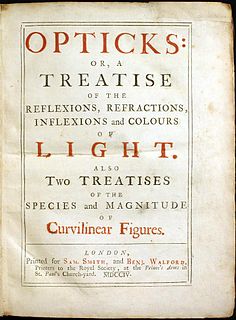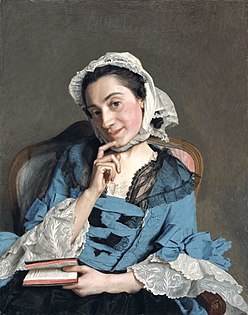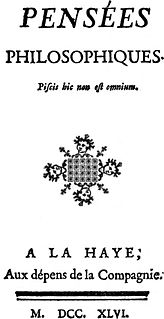
Denis Diderot was a French philosopher, art critic, and writer, best known for serving as co-founder, chief editor, and contributor to the Encyclopédie along with Jean le Rond d'Alembert. He was a prominent figure during the Age of Enlightenment.

Jean-Jacques Rousseau was a Genevan philosopher, writer, and composer. His political philosophy influenced the progress of the Enlightenment throughout Europe, as well as aspects of the French Revolution and the development of modern political, economic and educational thought.

François-Marie Arouet, known by his nom de plumeVoltaire, was a French Enlightenment writer, historian, and philosopher famous for his wit, his criticism of Christianity—especially the Roman Catholic Church—as well as his advocacy of freedom of speech, freedom of religion, and separation of church and state.

Jean-Baptiste le Rond d'Alembert was a French mathematician, mechanician, physicist, philosopher, and music theorist. Until 1759 he was, together with Denis Diderot, a co-editor of the Encyclopédie. D'Alembert's formula for obtaining solutions to the wave equation is named after him. The wave equation is sometimes referred to as d'Alembert's equation, and the Fundamental theorem of algebra is named after d'Alembert in French.

Encyclopédie, ou dictionnaire raisonné des sciences, des arts et des métiers, better known as Encyclopédie, was a general encyclopedia published in France between 1751 and 1772, with later supplements, revised editions, and translations. It had many writers, known as the Encyclopédistes. It was edited by Denis Diderot and, until 1759, co-edited by Jean le Rond d'Alembert.

Paul-Henri Thiry, Baron d'Holbach, was a French-German philosopher, encyclopedist, writer, and prominent figure in the French Enlightenment. He was born Paul Heinrich Dietrich in Edesheim, near Landau in the Rhenish Palatinate, but lived and worked mainly in Paris, where he kept a salon. He was well known for his atheism and for his voluminous writings against religion, the most famous of them being The System of Nature (1770).

William Kingdon Clifford was an English mathematician and philosopher. Building on the work of Hermann Grassmann, he introduced what is now termed geometric algebra, a special case of the Clifford algebra named in his honour. The operations of geometric algebra have the effect of mirroring, rotating, translating, and mapping the geometric objects that are being modelled to new positions. Clifford algebras in general and geometric algebra in particular have been of ever increasing importance to mathematical physics, geometry, and computing. Clifford was the first to suggest that gravitation might be a manifestation of an underlying geometry. In his philosophical writings he coined the expression mind-stuff.

In philosophy of mind, panpsychism is the view that mind or a mindlike aspect is a fundamental and ubiquitous feature of reality. It is also described as a theory that "the mind is a fundamental feature of the world which exists throughout the universe." It is one of the oldest philosophical theories, and has been ascribed to philosophers including Thales, Plato, Spinoza, Leibniz, William James, Alfred North Whitehead, Bertrand Russell, and Galen Strawson. In the 19th century, panpsychism was the default philosophy of mind in Western thought, but it saw a decline in the mid-20th century with the rise of logical positivism. Recent interest in the hard problem of consciousness has revived interest in panpsychism.

Opticks: or, A Treatise of the Reflexions, Refractions, Inflexions and Colours of Light is a book by English natural philosopher Isaac Newton that was published in English in 1704. The book analyzes the fundamental nature of light by means of the refraction of light with prisms and lenses, the diffraction of light by closely spaced sheets of glass, and the behaviour of color mixtures with spectral lights or pigment powders. It is considered one of the great works of science in history. Opticks was Newton's second major book on physical science. Newton's name did not appear on the title page of the first edition of Opticks.

Louise Florence Pétronille Tardieu d'Esclavelles d'Épinay, better known as Mme d'Épinay, was a French writer, a saloniste and woman of fashion, known on account of her liaisons with Friedrich Melchior, Baron von Grimm, and Jean-Jacques Rousseau, who gives unflattering reports of her in his Confessions, as well as her acquaintanceship with Denis Diderot, Jean le Rond d'Alembert, Baron d'Holbach and other French men of letters during the Enlightenment. She was also one of many women referenced in Simone de Beauvoir's The Second Sex as an example of noble expansion of women's rights during the 18th century.

The System of Nature or, the Laws of the Moral and Physical World is a work of philosophy by Paul-Henri Thiry, Baron d'Holbach (1723–1789).

The Indiscreet Jewels is the first novel by Denis Diderot, published anonymously in 1748. It is an allegory that portrays Louis XV as the sultan Mangogul of the Congo who owns a magic ring that makes women's genitals ("jewels") talk. The character of Mirzoza is a parable of Madame de Pompadour. Diderot portrayed Pompadour in a flattering light in The Indiscreet Jewels, most likely to ensure her support for his Encyclopedie.

Abraham-Alexis Quinault, called Quinault-Dufresne, was a French actor. He was a member of the Quinault family of actors.

Philosophical Thoughts is a 1746 book composed by Denis Diderot; it was his first original work.
Letter on the Deaf and Dumb, for the Use of those who hear and speak is a work by Denis Diderot containing a psychological investigation on the deaf-mute. It was published in 1751. It was meant to be a companion volume to Diderot's Letter on the Blind.
Paradox of the Actor, written between 1770 and 1778 but first published after the death of the author in 1830, is a dramatic essay by Denis Diderot elucidating a theory of acting in which it is argued that great actors do not experience the emotions they are displaying.

Essay on the Life of Seneca was one of the final works of Denis Diderot. It contains an analysis of the life and works of Seneca, criticism of La Mettrie and Jean-Jacques Rousseau, autobiographical notes, and a tribute to modern America. It was published in 1779. In 1782 a revised and expanded version of this essay titled Essay on the Reigns of Claudius and Nero was published.
Conversation with the Maréchale de *** is an essay by Denis Diderot containing a friendly dialogue, of a disputatious nature, between a religious lady and a freethinker, on theological issues. The content of the dialogue is polemical, but its tone has been variously described by modern commentators as being gentle, graceful, gracious, charming, witty and urbane. A Dutch publisher, to whom Diderot initially sent the manuscript, rejected it on the ground that it was too inflammatory. It was eventually published under an assumed name.
Refutation of Helvetius is a work composed in 1773 by Denis Diderot. It contains a rebuttal to some of the arguments made by Helvétius in his posthumously published work De l'Homme.
Jeanne-Catherine de Maux (1725-?), better known as Mme de Maux , was a natural daughter of Quinault-Dufresne. In 1737, aged twelve, she married a lawyer in Paris. She later became a lover of Denis Diderot's friend Damilaville. Some time after Damilaville's death, in 1768, she became the lover of Diderot, but later left him for a younger man.She is considered significant because many letters written by Diderot to her, containing scientific, philosophical, and romantic content, have survived. Diderot began writing Sur les femmes soon after his romantic relationship with Mme de Maux had ended. It has been stated that his romantic dalliance with Mme de Maux resulted in Diderot producing some of his best writings on love, sex, and sexuality.













